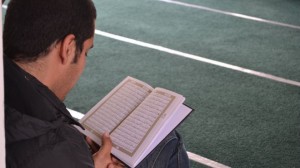Muslim Converts In Mexico Make Up A Diverse, Fast-Growing Community
MEXICO CITY – When Moroccan national Said Louahabi arrived in Mexico City in 1994, he and fellow Muslims had to attend religious services at the Pakistani embassy because there were no mosques or Islamic centers.
“I started looking for Muslims and a mosque when I first arrived,” Louahabi, an English teacher, told Fox News Latino. “At the time, we met at the Pakistani embassy, and there were only about 80 people — most of us were foreigners.”
Now, Louahabi prays alongside hundreds of other Muslims — foreigners and Mexicans alike — at the three-story Muslim Community Educational Center in the city’s upscale Anzures neighborhood.
Friday prayers at the Islamic Center are given in Arabic and Spanish. The crowd is diverse: Mexican converts to Islam, expatriates, embassy staff from the Middle East, Africa, Pakistan and Central Asia. The Islamic Center even fields a soccer team.
The mosque was packed at a service just before the beginning of Ramadan, the Muslim holy month, this year falling in July.
Many Mexicans who converted to Islam say they’ve been impressed with the religion’s growth in Mexico.
“I used the Internet and books to learn about Islam,” said Mexican convert Alexander Huttanos, an airline pilot who goes by his Islamic name, Ahmed Abbas. “Islam has come a long way in Mexico.”
He actually spent quite a bit of time researching different beliefs and faiths before making a final decision.
“I studied many religions, from Christianity to Judaism, Buddhism, African religions, until I found Islam,” he added.
“Allah’s path is very mysterious,” said Omar Remy, a Mexican who adopted Islam after a visit to Egypt in 1979 and now works for the Community Educational Center. “The Internet has helped. It allows people to communicate and investigate the religion.”
According to Louahabi, many Mexicans actually ended up converting after the 9-11 attacks drew their attention to the religion, piquing their interest.
“I think Islam is expanding mostly because of the Internet, and what happened on September 11,” he explained. “People were waking up, digging and searching to see whether we are really terrorists.”
And many realized that’s not the case, Louahabi said.
“We are just the opposite of what the media proclaim,” he added. “Islam is against terrorism.”
Estimates of the number of Muslims in Mexico vary widely. The Mexican government, for example, said there are about 3,700 Muslims in the country, while the Washington-based Pew Forum on Religion and Public Life estimated there are approximately 110,000.
Numbers aside, among Muslims in the country, there is little doubt that the community is already robust.
“It’s growing fast, incredibly fast,” Louahabi said of the community, pointing to his own experience.
“There are a lot of similarities with Christianity and Judaism, so it’s not difficult for people to grasp,” said Eduardo Luis Leajos Frias, a Mexican convert who adopted the Islamic name Lokman Idris.
“It will keep growing,” he added. “It will be comparable to the growth of evangelicals we’ve seen in recent years.”
Among the most prominent members of Mexico’s Muslim community is British-born convert Mark Omar Weston. Formerly a world-class professional water-skier, he runs an Islamic Center and hotel in the Mexican state of Morelos. The hotel serves food prepared in accordance with Islamic dietary practices, known as halal.
“Most Mexican converts to Islam discover the religion via the Internet,” he said in an interview with Fox News Latino. “It may become like evangelicals, or any of the many other Bible reading traditions that now exist in the country.”
According to Zidane Zeraoui al Awad, a professor of international relations at the Technological Institute of Monterrey, Islam in Mexico dates back to the Spanish conquest. “In all of Latin America, not just Mexico, Islam arrived with Spanish colonialism.”
But it was an Islam practiced covertly, he noted, by camp followers who had been forcibly converted to Catholicism.
Zeraoui added that while the children of many Muslim immigrants in Mexico have lost their religion, the number continues to grow because of Mexican converts.
“On one hand, the children of (immigrant) Muslims in Mexico tend to be non-Muslims,” he said. “But Islam is growing through converts. They are compensating for the loss of Islam among those with Muslim origins.”
“There is a bit of a cultural divide between immigrants that already came as Muslims and have taken their religion seriously and Mexicans converts who are curious,” noted Omar Weston.
“But generally speaking, teenagers and people in their 20’s have been around and see that there are other options,” he added. “I think that education as a whole helps people be more open to it (Islam).”
Although still a small community in comparison to other Latin American countries, the Muslim community in Mexico is extremely diverse. In Mexico City alone, there exists a Shi’ite Muslim women’s organization, a Sufi organization headed by two women, and a fundamentalist Salafi organization run by Muhammed Ruiz al-Mekisi, a Mexican convert to Islam.
Additionally, in the southern state of Chiapas, there exists a small community of indigenous Mayans who have been persuaded to convert to Islam by members of the Spain-based Murabitun World Movement. The Mayans have blended Islam with traditional practices.
“Here, we see a form of Islam that has been adapted to an indigenous culture,” Zeraoui said. “They are putting an indigenous angle on the religion, like they did with the Catholicism that was introduced during the colonial period.”
Percentage-wise, the largest Muslim population in the Americas is in Suriname, where nearly one out of five people are Muslims, according to the 2013 CIA World Factbook. Significant Muslim communities also exist in Guyana, Trinidad and Tobago, Argentina and Brazil.
Bernd Debusmann Jr. is a freelance journalist in Mexico City.


















